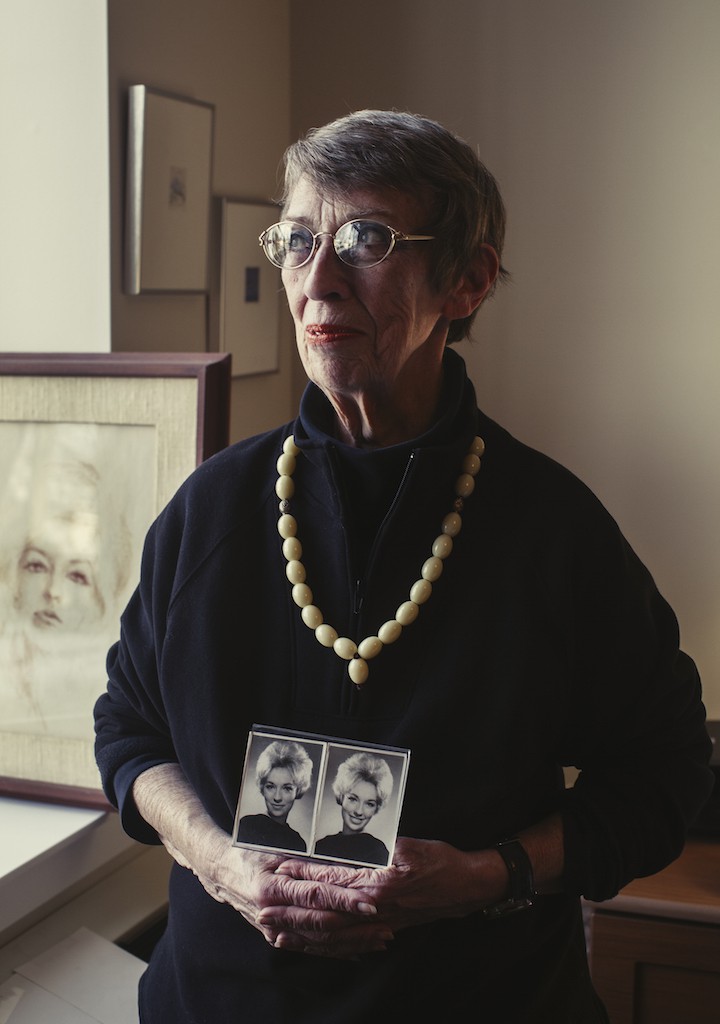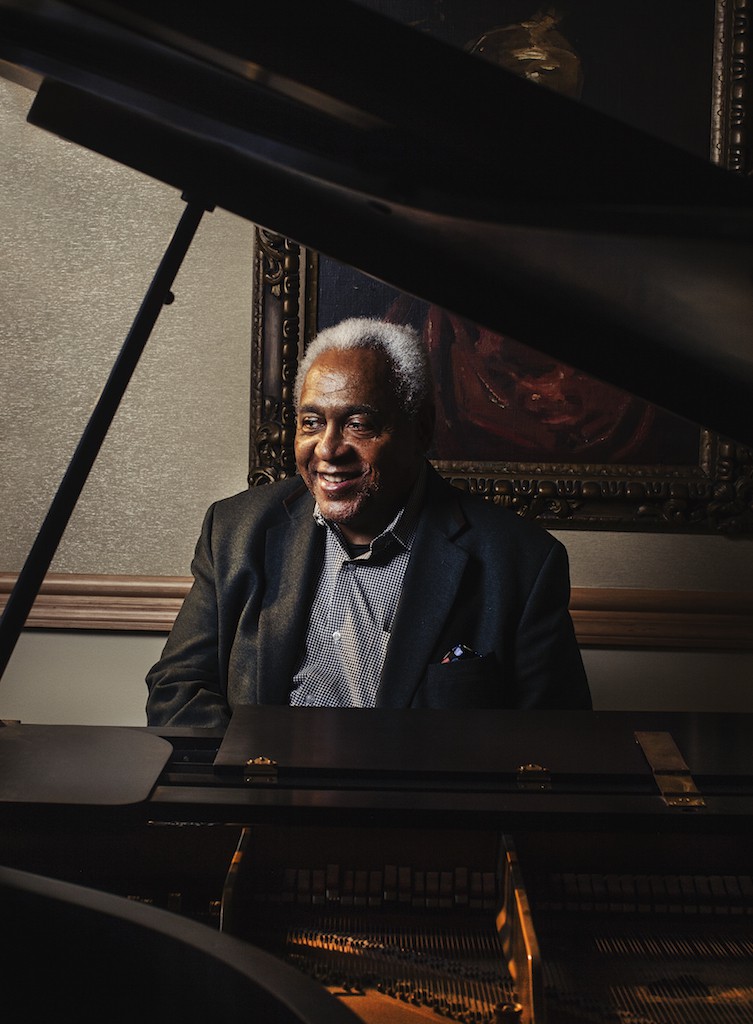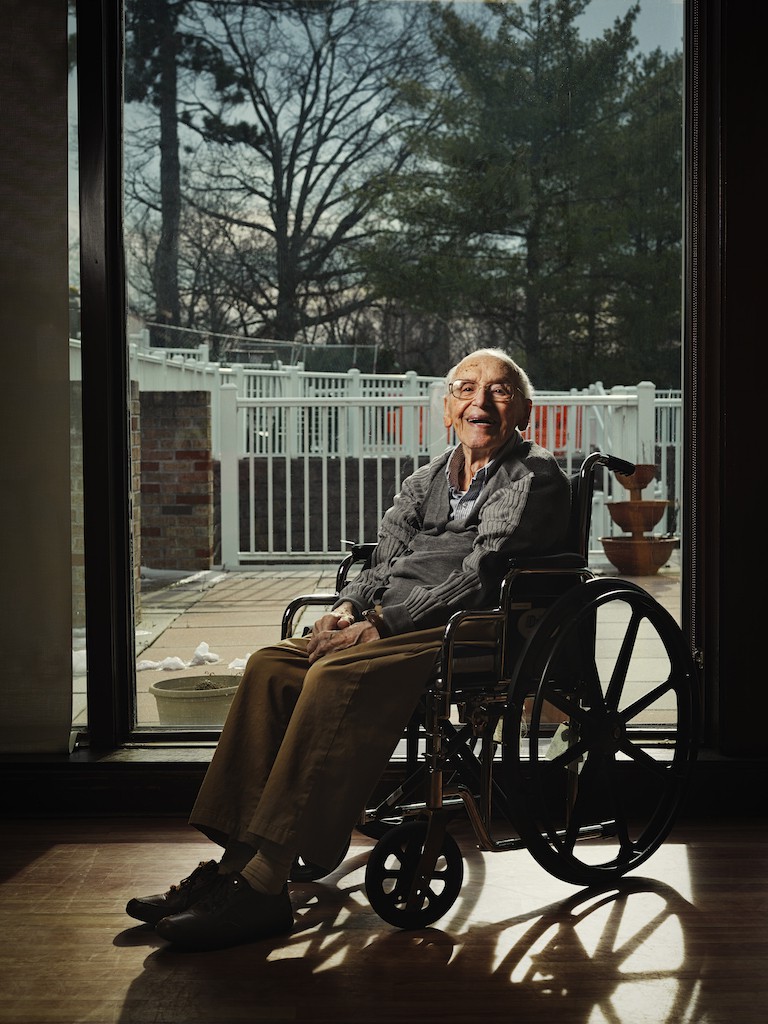
Louise Ogilvie, 92, wearing a blazer with a gold-lamé collar, a slightly sheer patterned blouse, dangling earrings, a string of pearls, and lipstick of a peachy color, wheeled into a carpeted room at the Lillian Booth Actors Home at 1 p.m. sharp, as punctual as if it were her own stage cue. The former club owner and performer lingered for a moment in the middle of the room, which is dominated by one of the facility’s forty grand pianos and was presently flooded with sunlight. Ogilvie made her way over to some circular green tables to sit beside her friend the former actress Connie Roderick, whose main credit is “Catholic Nun in Park” in Stuart Little 2. “It’s great,” Roderick said. “I still get residuals!”
Ogilvie and Roderick are two of the hundred and twenty-four stagehands, dancers, singers, vaudevillians, box office accountants, actors, and musicians who live at the skilled-nursing and assisted-living facility, which sits amid six acres of land in Englewood, New Jersey. Through these halls roam former leading men, aged sexpots, bit actors, those on whom the spotlight of fame fell fleetingly, and some whom it never touched, but who nevertheless toiled for a lifetime in the hopes that one day it would. Ogilvie, for her part, ran the Lamplighter’s Inn nightclub out of Fred Woolworth’s Puerto Rican hotel, El Convento, for twenty years; fellow resident Janet Sovey is a longtime fixture in New Jersey regional theater. Others gathered in the garlanded hall also included John Mace — who with his husband Richard Adrian Dorr served as a vocal coach to Bette Midler, Vanessa Redgrave, and Kim Basinger — and Allan Rich, the famously blacklisted actor with roles in Serpico and Curb Your Enthusiasm, sitting in a wheelchair with his fedora at a angle. The hallways outside are adorned with vintage theater and movie posters. It’s a Wonderful Life, reads one; Gone With the Wind, says another — reminders, perhaps, that the theater-folk who live here have arrived at the final act.
Today, however, they’d be the audience. As it has for the past seven years, a group of working thespians — all members of the American Guild of Variety Actors, one of the soup of unions one finds in the theater world — had arrived to perform for the residents. Ogilvie made her way over to Roderick, and those who weren’t already in seats took theirs. Turnout for the party was healthy, and the energy was high. The residents who waited for guests (they were permitted to invite up to four family members or friends) exuded a sense of anxious excitement so profound it felt like a physical presence. Others awaited no one.
“Many of our residents,” says Lucy Seligson, the director of social services, herself a former Broadway actress originally from Kentucky, “don’t have family in the New York City area.” That’s the Broadway hangover, awoken to here, at the home for uncomfortable truths. Few of those lured to the kinetic island by the promise of fame realize that when the house lights finally go on, their families will be far, far away. So they end up here. Or at least the lucky ones do.
The show was about to begin.

Earlier that morning, six AGVA members met at a dingy Dunkin’ Donuts near the Port Authority to head out to Jersey. The organization was much stronger when variety shows were more common. Today, jokes Chris Johnson, the tall, soft-eyed union man who arranges the holiday performance, “we get shows with dogs and strippers.”
The numbers were still strong enough to field a traveling troupe, including: Laura Dadap, an actress with credits as Marcy Park in a regional production of The 25th Annual Putnam County Spelling Bee and as the young mom in a Target employee training video; an actor named Dylan Thompson, who’s done tours on cruise ships and currently appears in Naked Boys Singing; and a doe-eyed singer and producer named Darryl Reuben Hall — “I use the Reuben,” he notes wryly, “because there’s another Darryl Hall.” In the backseat, holding a stuffed garment bag, sat Ron Brooks, a lithe dancer who describes his act as “movement with a little bit of fluff,” and Meg Lanzarone, a bubbly blonde actress and impressionist from Long Island who appears in Newsical the Musical.
When they arrived, the performers found a rehearsal space — Aaron’s Play Room, named after Elvis Presley’s longtime songwriter Aaron Schroeder, who was a resident at the home before he died in 2009. It was unclear if they were aware how tough the crowd was. But as Yalile Chavez, the director of recreation, says, “If the residents don’t like a performer, they just won’t show up.” Chavez says she often has to book smaller and smaller rooms to mask the dwindling crowd if the performers aren’t up to snuff. “The residents are very vocal,” she says. (As Rich put it, “If it ain’t a ten, I don’t want to see it.”)
To prepare, the group ran through a few arrangements, deciding on keys and parts. Hall, who boasts a rich tenor, lent his power to a rendition of “Silent Night.” Lanzarone, a soprano, attempted a few high notes before sighing, “That’s not going to happen today.” Thompson paused to reflect, “There’s a certain amount of peace you have to make with the realization that even if you make a contribution to the arts which feels big, it’s one tiny star in an enormous sky.” “Life’s just so short,” said Lanzarone. Then they sang “Deck the Halls.”
Soon they emerged. Dadap wore a bright red nose that lit up. Lanzarone wore a long Santa hat. Brooks had changed into spandex dance pants and a red tank top. Teak Lewis, 82, and Janet Covey, 73, had already set up their table in the hallway. Lewis, a dancer who appeared on The Bell Telephone Hour with Eleanor Powell, and Covey, who worked with Gypsy Rose Lee “back when she was trying to be an actress,” were selling scarves they had knit for $20 apiece. Lewis, portly but spry, smiled as the visitors entered. He always looks forward to their coming. “It reminds me of what I used to do,” he said. “It gets me closer to who I used to be.” Dadap bought a scarf to keep.

Showtime. Thompson, who anchored himself by the piano, nailed a high-camp version of “The Christmas Song.” His voice was as syrupy and sweet as the orange sauce accompanying the egg rolls, and his eyebrows seesawed with emotion. Mace quietly solfèged the entire thing. He applauded Thompson’s “even vibrato.”
The revue was not without hiccups. Larry Woodard, a pianist and cabaret performer, grimaced when Thompson muffed the words. “It’s ‘Santa’s on his way. He’s loaded lots of toys and goodies on his sleigh.’ He’s got it backwards.” (Eventually he pronounced Thompson a “stellar interpreter.”) Dadap enthusiastically performed “Rudolph the Red-Nosed Reindeer,” but when she forgot the words to “We’ll Meet Again” — vamping “I’ve forgotten the words…” — the room bristled. Still, through sheer force of charisma, Dadap won them over by the end. “We try to be nice,” said Ogilvie. “We try.”
Next came Brooks, who had been stretching in the hallway. After limbering up, Brooks performed an Alvin Ailey–style number to Whitney Houston’s “Who Would Imagine a King.” Then came a fast-paced conga to Ricky Martin’s “Ay Ay Ay It’s Christmas” — during which he conga’d behind the actor Skipp Lynch as Lynch slowly made his way with a walker to his seat.
Finally, it was time for the pièce de résistance.The words of Leonard Cohen’s “Hallelujah” — as interpreted by k.d. lang — came on over the sound system. From atop the piano Brooks picked up a wreath he had made earlier — “That’s my arts and crafts coming through!” — and put it around his neck and under one arm like a sachet. He moved lyrically between the wheelchairs and tables, pirouetting on the carpet and extending his arms heavenward.
From his wreath, he plucked plastic flowers, in which were hidden Charms mini-pops. Brooks distributed the plastic lollipop-flowers, while Dadap and Lanzarone clutched each other, eyes streaming with tears. “Baby I’ve been here before/I’ve seen this room and I’ve walked this floor.” A flower for Rich, who cast a cool appraising eye onto it. “I used to live alone before I knew you” — a flower for Mace, who gamely grabbed it. “Love is not a victory march/It’s a cold and it’s a broken hallelujah.” A flower for Ogilvie, who politely took the lollipop and gently placed it on the plastic plate before her, to save, perhaps, for later.